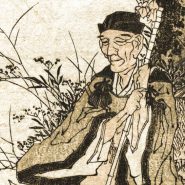Ghost House
A ruined homestead becomes companionable in “Ghost House,” where nature and memory reclaim a life quietly.
My November Guest
In “My November Guest,” a personified Sorrow teaches the speaker to love the austere beauty of late autumn.
Mowing
Frost’s “Mowing” praises labor’s truth over fantasy: the scythe’s whisper makes craft and attention the poem’s ethics.
The Death of the Hired Man
In “The Death of the Hired Man,” Frost turns domestic talk into moral drama — a quiet debate on mercy, home, and human worth.
Birches
Between fact and wish, “Birches” turns play into a poetics of escape and return — a prayer for balance rather than transcendence.
Once by the Pacific
A storm gathers with apocalyptic force in Frost’s sonnet “Once by the Pacific,” a cool, exact vision of power beyond human scale.
Reluctance
Frost’s “Reluctance” weighs the dignity of refusal against nature’s insistence on change, ending with a stark challenge to easy acceptance.
The Pasture
A gentle invitation to shared attention, “The Pasture” makes pastoral chores into hospitality and announces Frost’s companionable voice.
The Sound of the Trees
In “The Sound of the Trees,” Frost turns ambient rustle into the cadence of decision, where thought itself becomes the poem’s action.
Acquainted with the Night
A modern terza rima, “Acquainted with the Night” traces an urban circuit of solitude where time is “neither wrong nor right.”
Design
Frost’s sonnet “Design” frames beauty and predation to ask whether darkness, not benevolence, orders nature’s smallest scenes.
The Oven Bird
In “The Oven Bird,” Frost crafts a modern ars poetica: how to “make of a diminished thing” when beauty has already fallen.
